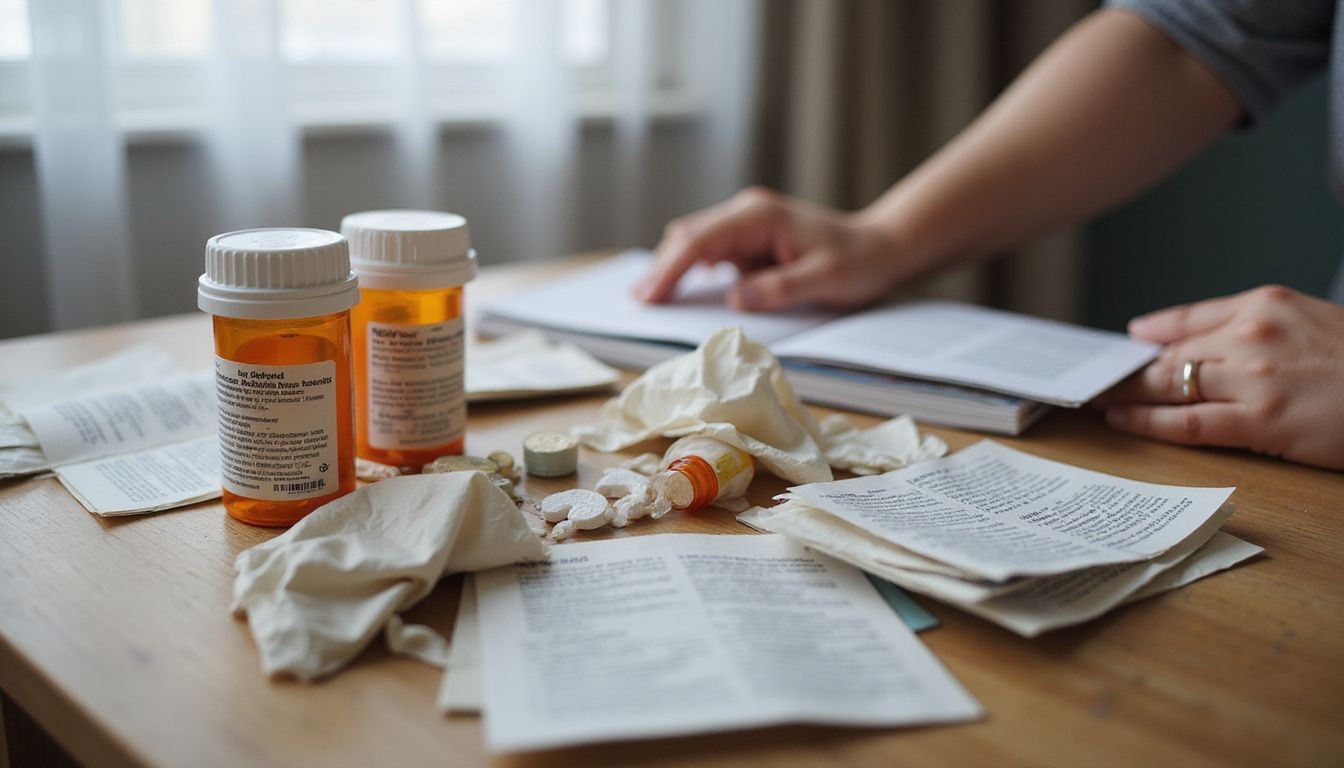Living with attention deficit hyperactivity disorder can feel overwhelming for many children and adults. You may struggle to focus at school, work, or even during daily routines. Tasks become harder.
Impulse control can feel out of reach. Many people feel lost trying to manage these symptoms.
Adhd medication is often used to treat ADHD and can help ease symptoms like restlessness and lack of focus. These medications work by boosting important chemicals in the brain, such as dopamine and norepinephrine.
Each person may respond differently to medication, but most see improvement once they find the right medication and dose.
This blog explains the different types of adhd medications, their benefits, and possible side effects. You will also learn how doctors help find the best treatment plan for you or your child.
Keep reading to find out how treatment for ADHD can help manage symptoms and improve daily life.
Types of ADHD Medications

ADHD medications come in two main categories: stimulant and non-stimulant. Stimulants, such as methylphenidate and amphetamine, often provide quick relief from symptoms. Non-stimulant options like atomoxetine and guanfacine offer alternatives for those who may not respond well to stimulants.
Stimulant Medications
Stimulant medication is the most common ADHD treatment. Doctors often use methylphenidates like Ritalin and Concerta or amphetamines such as Adderall and Vyvanse for treating ADHD in children and adults.
Stimulants increase dopamine and norepinephrine in the brain, which help control symptoms of ADHD but do not cause overstimulation. Evidence shows that about 80% of children with ADHD feel better after finding the right medication and dose.
The United States Food and Drug Administration requires strict control of stimulants, classifying them as prescription drugs. Some states only allow a 30-day supply at a time. Short-acting stimulants last around four hours; these can cause a “crash” as effects wear off.
Extended-release tablets or capsules work six to sixteen hours, making daily routines easier to manage. Before starting stimulant adhd medication, some patients might need an electrocardiogram to check heart rhythm, especially if there are concerns about cardiovascular disease.
Supply shortages can affect immediate-release drugs like Adderall IR, which has been ongoing since 2022.
Non-Stimulant MedicationsAbout 80% of children with ADHD show fewer symptoms on the right stimulant medication, says experts from the Institute of Psychiatry, Psychology and Neuroscience.
Non-stimulant medications for ADHD work mainly by increasing noradrenaline in the brain. Doctors use these treatments if stimulant drugs do not work, cause side effects, or need to be paired with other therapy.
Atomoxetine (Strattera) and viloxazine (Qelbree) are noradrenaline reuptake inhibitors. These help control ADHD symptoms in children as young as six and in adults. Guanfacine (Intuniv) and clonidine (Kapvay), which are alpha-2 adrenergic agonists, help reduce distractibility and improve impulse control.
Non-stimulant ADHD medications may take three to four weeks to show full effect. People taking these drugs are less likely to face insomnia, appetite suppression, or substance misuse risk compared to those on stimulant drugs.
Healthcare professionals must closely monitor anyone on non-stimulant medication, especially those with heart conditions, due to possible changes in blood pressure and heart rate. These drugs offer a different approach to the management of attention deficit hyperactivity disorder and can be used alongside behaviour therapy or other treatment methods.
Benefits of ADHD Medication
ADHD medication can boost focus and attention in people with ADHD. It helps improve impulse control, making daily tasks easier to manage.
Improved Focus and Attention
Stimulant medications like methylphenidate and amphetamines boost neurotransmitter activity in the brain. These chemical substances help people with ADHD concentrate better and increase their attention span.
Around 80 percent of children with the disorder respond well to the right medication and dose, according to research. Improved focus often leads to better results in school and daily life.
Nonstimulant ADHD medications such as atomoxetine, guanfacine, and clonidine also support focus and attention. Modified-release dosage forms can provide stable effects throughout the day, which helps children and adolescents stay on task during lessons.
Some tablets and capsules can be opened or sprinkled on food, assisting those who struggle with swallowing pills. Ongoing research looks at new treatments that target attention and may further improve outcomes for people with this neurodevelopmental disorder.
Better Impulse Control
Many common ADHD medications target neurotransmitters like dopamine and noradrenaline. These brain chemicals play a big part in impulse control. Medications used to treat ADHD, such as methylphenidate and lisdexamfetamine, help balance these chemicals.
The effect of ADHD medication can make it easier for people to pause and think before acting. Extended-release stimulants reduce the need to take medicine often through the day, which helps keep behaviour steady.
Alpha-2 adrenergic agonists, like guanfacine and clonidine, are another type of medication used to manage impulsivity, especially in children and adolescents. Non-stimulant medications offer another way to reduce sudden actions or risky behaviour in those with anxiety or substance use disorder.
Behavioural therapy and mindfulness work well alongside medication use, especially for children aged six and older.
Medication for ADHD may help children and adults stop and think before acting, improving daily life and relationships.
Potential Side Effects of ADHD Medications
ADHD medications can cause various side effects. Common reactions include sleep issues and increased appetite. Some patients may also experience more serious problems like heart arrhythmia or mood changes.
Always monitor your health while taking these treatments closely.
Common Side Effects
Common side effects occur in many individuals taking ADHD medication. Understanding these effects aids in informed decision-making.
- Reduced appetite affects about 80% of people on stimulant ADHD medication. This often leads to weight loss, which might require adjustments in meal timing or diet.
- Difficulty sleeping is prevalent among those who take ADHD medications. Adjusting the timing of the dose may help improve sleep patterns.
- A rebound effect can happen as the medication wears off, causing fatigue, increased activity, or changes in mood.
- Anxiety and depression can increase when starting or adjusting medication. New symptoms might emerge alongside existing behaviours.
- An upset stomach may occur, especially at the beginning of treatment, leading to nausea or vomiting in some cases.
- Children and adolescents might experience minor growth delays while on these medications; however, this typically does not affect their final adult height.
- Slight increases in blood pressure and heart rate may be observed during treatment; regular monitoring is essential for safety and health management.
- Other common side effects include fatigue and changes in mood. These can impact daily activities and relationships significantly.
Rare but Serious Side Effects
ADHD medications can sometimes lead to serious side effects. While many people tolerate these drugs well, some effects require attention.
- Stimulant medications like amphetamines may trigger psychosis in certain individuals. The risk of psychotic episodes is higher with these compared to methylphenidate.
- Atomoxetine, a non-stimulant option, can cause rare liver damage. This risk exists although it is not common.
- Some users experience increased suicidal thoughts, especially children and adolescents taking atomoxetine. Monitoring mental health during treatment is necessary.
- Cardiovascular complications may arise from stimulant use; these medications can affect heart rate and blood pressure.
- Serious consequences from methylphenidate use are generally less significant than with other stimulants; however, caution is still necessary.
- Children with congenital heart disease or specific medical conditions should avoid stimulant medications due to potential risks.
- Over 50% of children with tic disorders also have ADHD, requiring careful consideration of medication options when tics worsen.
Being aware of these serious side effects helps in making informed decisions about the treatment of ADHD through medication.
Finding the Right Medication
Finding the right medication for ADHD often requires a personalised approach. Health care professionals can help tailor treatment plans to meet individual needs and preferences.
Personalised Treatment Plans
Personalised treatment plans concentrate on the unique needs of each patient. Mentalwell creates these plans for ADHD treatment, offering both 6-month and 12-month options priced at £750 and £1,500, respectively.
The titration process starts with low doses that increase based on feedback from patients. This gradual approach helps customise medication to individual responses.
Regular check-ins and ongoing support play essential roles in successful management. Active participation ensures that patients communicate their experiences effectively. Healthcare providers closely monitor behaviours and side effects to adjust dosages as needed.
This attention to detail reduces adverse effects while enhancing the benefits of ADHD medications tailored specifically for each personâs situation.
Conclusion
ADHD medication plays a key role in managing symptoms like hyperactivity and impulsivity. People often notice improvements in focus, attention, and behaviour when they find the right treatment.
Stimulant and non-stimulant medications offer varied options for individuals with ADHD. While these treatments can help many, some may face side effects or need adjustments along the way.
Overall, effective treatment requires patience and personalised approaches to best support each unique individual.
References
- https://my.clevelandclinic.org/health/treatments/11766-adhd-medication
- https://bedslutonchildrenshealth.nhs.uk/neurodiversity-support/adhd-attention-deficit-hyperactivity-disorder/medication-for-adhd-attention-deficit-hyperactivity-disorder/ (2024-11-27)
- https://www.webmd.com/add-adhd/adhd-nonstimulant-drugs-therapy (2025-07-12)
- https://www.sciencedirect.com/science/article/pii/S016372582100142X
- https://www.adhdcentre.co.uk/what-will-adhd-medication-do-effects-outcomes-considerations/ (2024-04-15)
- https://www.adhdcentre.co.uk/understanding-adhd-medication-side-effects-what-to-watch-for-and-when-to-seek-help/ (2025-01-25)
- https://pmc.ncbi.nlm.nih.gov/articles/PMC10601982/
- https://www.webmd.com/add-adhd/childhood-adhd/adhd-serious-medication-side-effects
- https://www.mentalwell.co.uk/treatment-plans
Our own struggles in life have led us to this path of understanding the human condition. United by a shared curiosity for the mind and what it means to be human, we’ve each walked a journey shaped by personal challenges and a deep interest in helping others grow. Over the last eight years, our work has centred on exploring how meditative practices meet modern approaches to psychological wellbeing.

